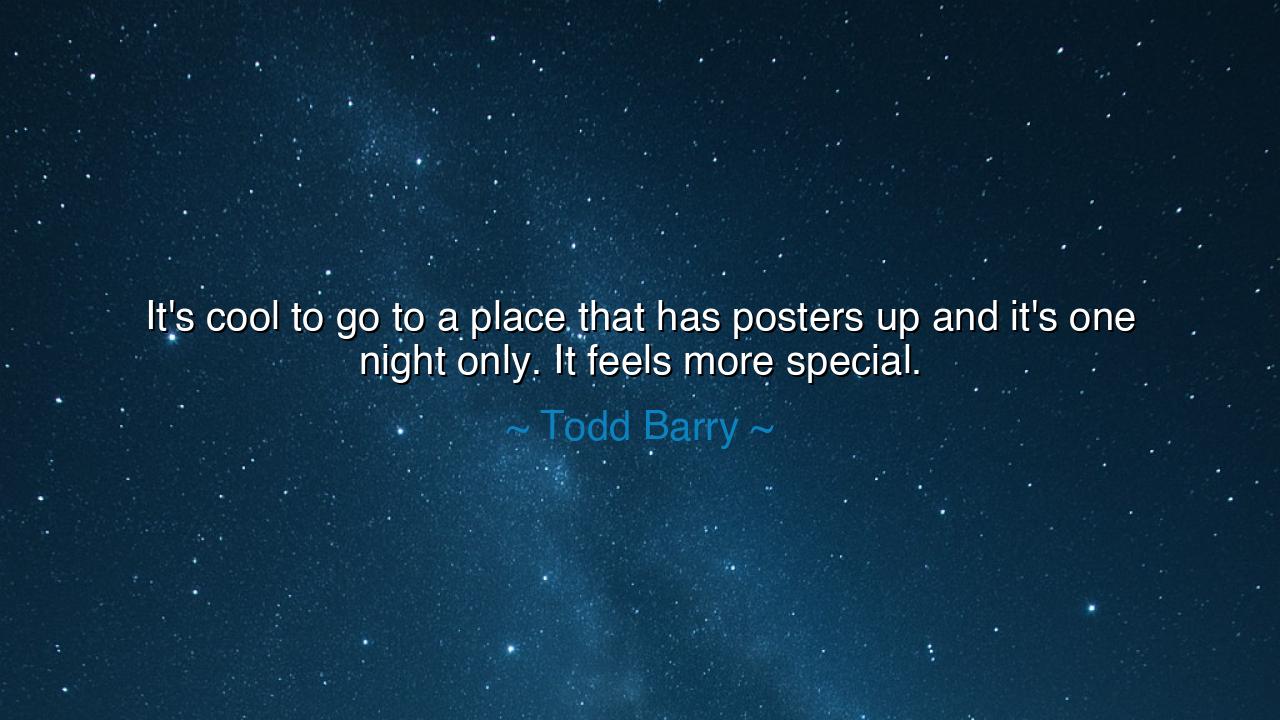
It's cool to go to a place that has posters up and it's one night
It's cool to go to a place that has posters up and it's one night only. It feels more special.






In the vast expanse of human history, the value of rarity has always been a source of deep meaning. The ancients understood that there is a profound sacredness to moments that are fleeting, to experiences that cannot be replicated, for it is in the brief and singular that we find the most profound impact. Todd Barry’s words, “It’s cool to go to a place that has posters up and it’s one night only. It feels more special,” tap into this ancient truth—the idea that the temporary and unique hold a special power. When something is one night only, it becomes more cherished, more memorable, for its rarity adds weight to the experience, turning the ordinary into the extraordinary.
In the ancient world, the idea of rarity was deeply embedded in the culture. Consider the great festivals in Athens, where the mysteries of Eleusis were celebrated only once a year. These were not events that could be experienced at will; they were one night, one occasion, and it was in this temporary nature that the rituals and ceremonies became sacred. The people understood that the specialness of the event was tied to its elusiveness, that by limiting the experience, the event became more valuable and memorable. In this sense, Barry’s insight reflects a wisdom that stretches back to the ancient understanding that rarity and limitation imbue an experience with a weight that is not found in the everyday.
In the same way, the ancient Olympic Games were an event that happened only once every four years. The athletes, the spectators, and the participants felt a tangible sense of anticipation, for they knew that the moment they were about to witness or partake in would not come again for another cycle of the sun. The rarity of the Olympic Games added to their value, making the event feel more like a blessing, a unique gift of time. The ancients knew that time itself was a precious and finite resource, and that by creating scarcity, they could turn even a mere competition into a celebration of life. Similarly, Barry’s words capture this idea of scarcity as a catalyst for memorable experiences.
Moreover, the ancient philosophers often spoke of the importance of the moment—of experiencing the present fully without distraction or the promise of future repetitions. Epictetus, the Stoic philosopher, taught that life’s true beauty comes from embracing the present as it is, and he emphasized that events, whether joyful or sorrowful, must be experienced in their fullness, for they are transient. If every moment were to be repeated or guaranteed, it would lose its value. In this way, Barry’s reflection on the one-night-only event mirrors the Stoic philosophy: the knowledge that an experience is fleeting makes us more attuned to its full significance.
Consider the impact of a limited engagement in the arts, such as a one-night-only performance by a famed actor or musician. The rarity of such events often amplifies their importance, giving the audience a sense that they are partaking in something special, something that cannot be replicated. The moment becomes sacred, and the people who attend such events are marked by the knowledge that they were there for something that transcends the ordinary. In this, the audience shares in the experience of ancient rituals, where participation in the singular and unique becomes a key to understanding the deeper meaning of life itself. The ephemeral nature of these performances forces us to live fully in the present.
The lesson from Barry’s statement is clear: rarity makes moments precious. When things are finite, they are valued more deeply, and this truth has been passed down through the ages. The ancients understood that scarcity does not merely create value; it enriches the experience, imbuing it with meaning that cannot be replicated. By creating scarcity, by embracing the idea that an experience may not come again, we make it more sacred and special.
In your own life, consider the moments you hold dear. What if you saw each day not as an endless cycle but as a precious, singular moment? How might you experience your relationships, your work, or your passions differently if you approached them with the understanding that they may not last forever, and that their rarity is what gives them their depth and beauty? Like the ancient festivals, Olympics, and performances, embrace the idea that the fleeting nature of an experience is what makes it worth living. Don’t wait for tomorrow to appreciate today—because today, like the one-night performance, is a gift that won’t come again.






AAdministratorAdministrator
Welcome, honored guests. Please leave a comment, we will respond soon